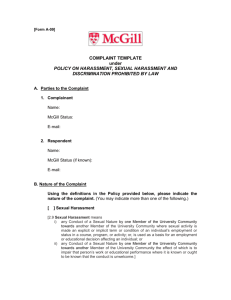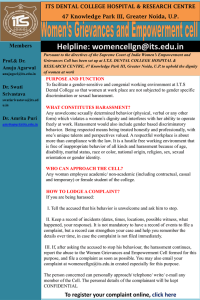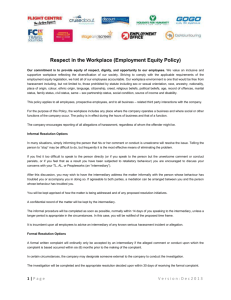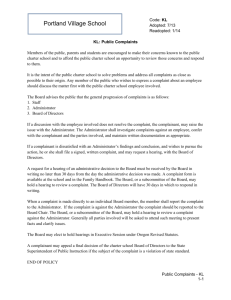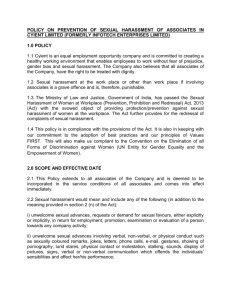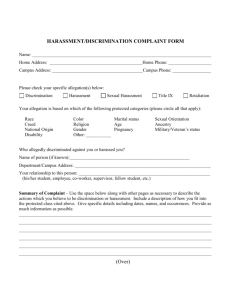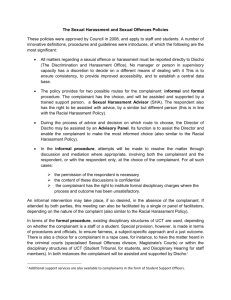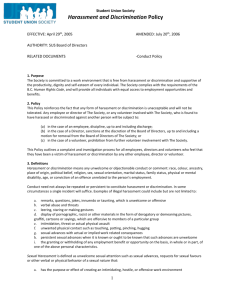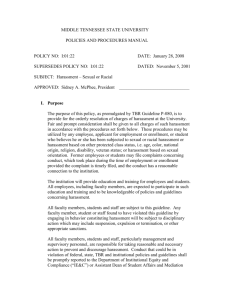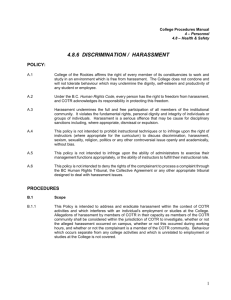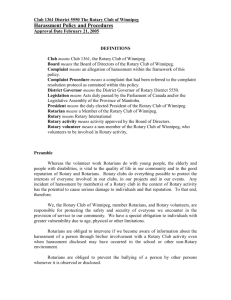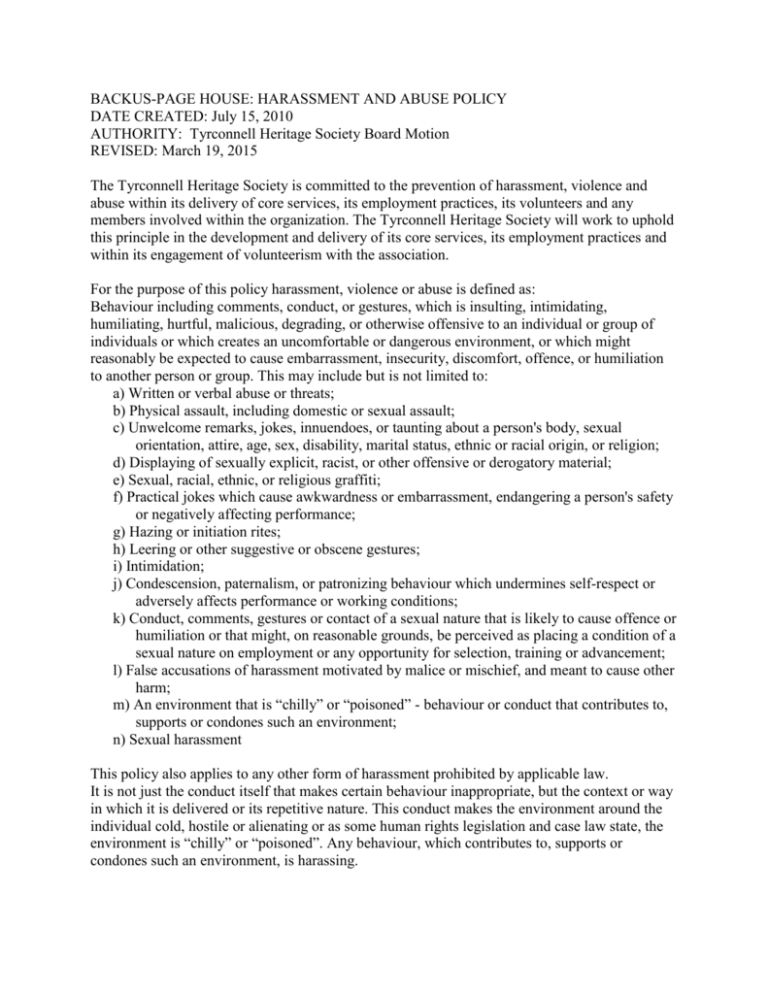
BACKUS-PAGE HOUSE: HARASSMENT AND ABUSE POLICY
DATE CREATED: July 15, 2010
AUTHORITY: Tyrconnell Heritage Society Board Motion
REVISED: March 19, 2015
The Tyrconnell Heritage Society is committed to the prevention of harassment, violence and
abuse within its delivery of core services, its employment practices, its volunteers and any
members involved within the organization. The Tyrconnell Heritage Society will work to uphold
this principle in the development and delivery of its core services, its employment practices and
within its engagement of volunteerism with the association.
For the purpose of this policy harassment, violence or abuse is defined as:
Behaviour including comments, conduct, or gestures, which is insulting, intimidating,
humiliating, hurtful, malicious, degrading, or otherwise offensive to an individual or group of
individuals or which creates an uncomfortable or dangerous environment, or which might
reasonably be expected to cause embarrassment, insecurity, discomfort, offence, or humiliation
to another person or group. This may include but is not limited to:
a) Written or verbal abuse or threats;
b) Physical assault, including domestic or sexual assault;
c) Unwelcome remarks, jokes, innuendoes, or taunting about a person's body, sexual
orientation, attire, age, sex, disability, marital status, ethnic or racial origin, or religion;
d) Displaying of sexually explicit, racist, or other offensive or derogatory material;
e) Sexual, racial, ethnic, or religious graffiti;
f) Practical jokes which cause awkwardness or embarrassment, endangering a person's safety
or negatively affecting performance;
g) Hazing or initiation rites;
h) Leering or other suggestive or obscene gestures;
i) Intimidation;
j) Condescension, paternalism, or patronizing behaviour which undermines self-respect or
adversely affects performance or working conditions;
k) Conduct, comments, gestures or contact of a sexual nature that is likely to cause offence or
humiliation or that might, on reasonable grounds, be perceived as placing a condition of a
sexual nature on employment or any opportunity for selection, training or advancement;
l) False accusations of harassment motivated by malice or mischief, and meant to cause other
harm;
m) An environment that is “chilly” or “poisoned” - behaviour or conduct that contributes to,
supports or condones such an environment;
n) Sexual harassment
This policy also applies to any other form of harassment prohibited by applicable law.
It is not just the conduct itself that makes certain behaviour inappropriate, but the context or way
in which it is delivered or its repetitive nature. This conduct makes the environment around the
individual cold, hostile or alienating or as some human rights legislation and case law state, the
environment is “chilly” or “poisoned”. Any behaviour, which contributes to, supports or
condones such an environment, is harassing.
Informal Complaint Procedure
A person who thinks he or she has been subjected to conduct which constitutes harassment under
this policy (the "Complainant") is encouraged to make it known to the person responsible for the
conduct (the "Respondent") that the behaviour is unwelcome, offensive and contrary to this
policy.
If confronting the Respondent is not possible, or if after confronting the Respondent the conduct
continues, the Complainant should seek the advice of the Cultural Manager or member of the
Tyrconnell Heritage Society Board of Directors.
At the initial meeting with the Cultural Manager or representative of the Board of Directors, the
Complainant will be informed of the following:
i)
The role of the Cultural Manager or Board of Directors representative is a conduit
between the Tyrconnell Heritage Society Board of Directors and the Complainant.
ii)
The option to pursue an informal resolution of the complaint;
iii)
The right to lay a formal written complaint under this policy when an informal
resolution is inappropriate or not feasible;
iv)
The availability of mediation and other support;
v)
The confidentiality procedure, as required by law;
vi)
The right to be represented by a person of choice, including legal counsel, at any
stage in the complaint process at the individual’s own expense;
vii)
Information gathered from alleged harassment complaints and those settled
informally or formally will be filed with the Tyrconnell Heritage Society
administration;
viii) The right to withdraw from any further action in connection with the complaint at
any stage.
The Cultural Manager or Board of Directors representative acts as a neutral party. His /
her role is to gather information and liaise with the Steering Committee until the
complaint is resolved informally or proceeds to the formal step of this policy. The
representative may provide support to both the Complainant and the Respondent in order
to facilitate a satisfactory resolution for both parties.
Should the complaint not be resolved through informal procedures, nor is it more appropriate to
deal with under another policy, the complaint shall proceed to the Formal Complaint procedures
of this Policy.
Formal Complaint Procedure
The Cultural Manager or Board of Directors representative shall obtain from the Complainant a
statement in writing outlining the details of the incident(s) and the names of any witnesses. The
statement will be dated and signed by the Complainant. All formal complaints coming forward
will be investigated.
The Board of Directors, may seek the advice and/or hiring of legal counsel, only after approval
through board motion, giving all information they require couched in such language as to protect
the privacy of those involved.
The Tyrconnell Heritage Society’s Board of Directors will contract legal counsel to investigate
formal complaints. Counsel will report to the Board of Directors.
The Tyrconnell Heritage Society Board of Directors shall provide to legal counsel all the
information the Cultural Manager or Board of Directors representative has collected surrounding
the complaint. In the investigation and resolution of the complaint by legal counsel, the
Tyrconnell Heritage Society will respect the spirit of Canadian law and take the appropriate
recommended actions, as required.


